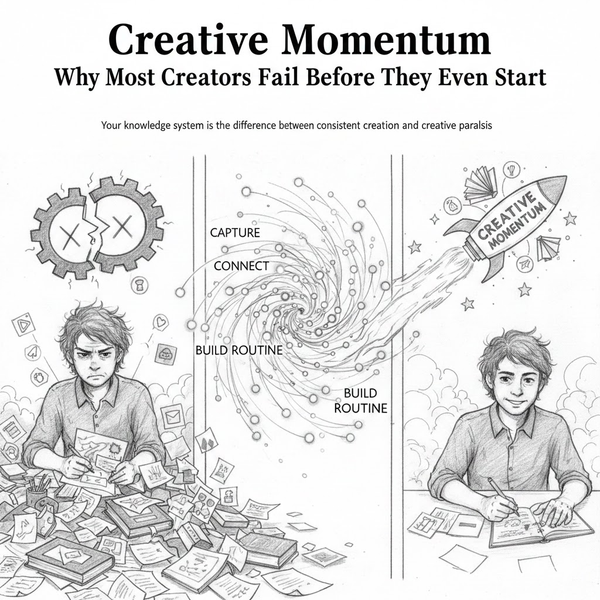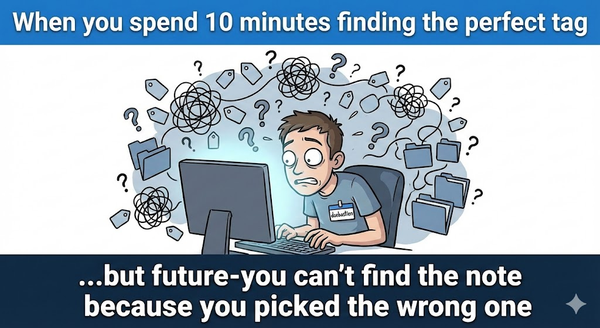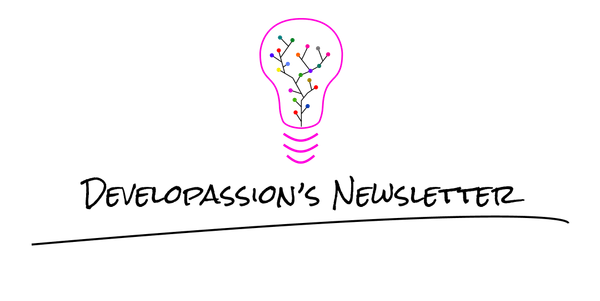DeveloPassion's Newsletter 197 - Context Engineering
A newsletter discussing AI, Knowledge Work, Knowledge Management Systems, Zen Productivity, Personal Organization, and everything in between!

Hello everyone! I’m Sébastien Dubois, your host. You’re receiving this email because you signed up for DeveloPassion’s Newsletter. Thank you for being here with me ✨
If you enjoy this, please forward it to your friends 👍. If this email was forwarded to you, then don’t forget to subscribe and become a supporter. You can also follow me on X, Bluesky, and Mastodon.
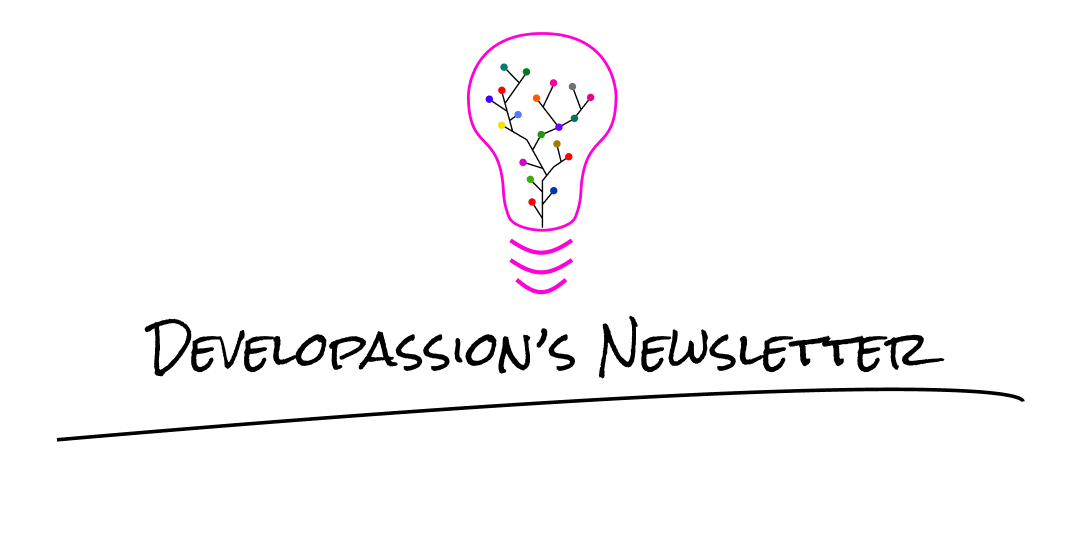
Welcome
Another week, another newsletter! I hope that you all had a great one 🤩
We're finally past the heat wave. We were apparently under a Heat dome, and that was no fun. It's funny how we usually complain about the rain over here, but also complain when the sun is out 😂
This week I've continued working on my AI Assistant. I'm thinking a lot about the idea of "Context engineering", and the more I spend time exploring approaches, the more I feel like this is the (current) best way to use AI and get valuable outputs. I'll share the gist of the idea further in this edition, but will surely share notes and articles about this in the future.
And next week, I'LL BE ON VACATION for a week and a half. Can't wait to be there now. And can't wait to be back with you later in July ❤️
Alright, let's gooooo 🚀
This Week's Highlights
- Context engineering for dummies
- Evolution of my AI assistant from a single massive prompt to isolated/focused contexts
- Published "The Reasons I'll Never Switch from Obsidian to Tana"
Before You Go Any Further
I want to reach more people. Got 60 seconds? Then share the link with one friend/colleague who would benefit from joining us! And of course, don't forget to also mention the Knowii Community ❤️
And if you bought some of my products or courses? Then please leave a rating/review. It really helps a lot ❤️
Context engineering for dummies
Most people think AI prompts are just about asking the right questions. But it's actually only a part of the story. The answers you get from AI don't only depend on the questions on ask, but also on the context you provide, and how you structure your prompts.
Let's put the question and prompt structure parts aside, and let's focus on the context part. For the sake of the explanation, let's also forget about the "tools" and "capabilities" that current Large Language Models (LLMs) can use (e.g., Web Search, Deep Research, Model Context Protocol (MCP), etc). Last but not least, consider this as a useful mental model. It's not an exact science. there are tons of variables and variance between different models and things keep changing.
Context is the additional information you provide along with your question(s). Think of it like this: if you just ask questions to AI without providing any context, all you can get are generic responses that could apply to anyone/anything. But if you provide context, you actually help the AI "focus" its attention mechanism, and provide you an answer that "makes sense" for the given context. Thus, context can be considered as a filter or funnel. The more specific the context, the more specific the answer.
But it's not as simple. In reality, the quality and quantity of provided context heavily impacts the quality (i.e., relevance, specificity, accuracy, etc.) of the responses you can get.
I have four different cases in mind:
- If you don't provide any context, you'll get generic answers
- If you don't provide enough context, you'll get vague answers
- If you provide the ideal context, you'll get a very specific answer
- If you provide too much context, you'll end up with AI hallucinations
I think of context as a "guide", "filter" or "funnel" between the set of possible answers and the one that AI gives you back. It's an oversimplification of course. But I feel like it's a useful mental model. It's the exact same thing when you discuss with a junior teammate. You could flood them with information, but they would just end up being confused. You have to provide them enough information/context for the task at hand.
Here's how I picture this:
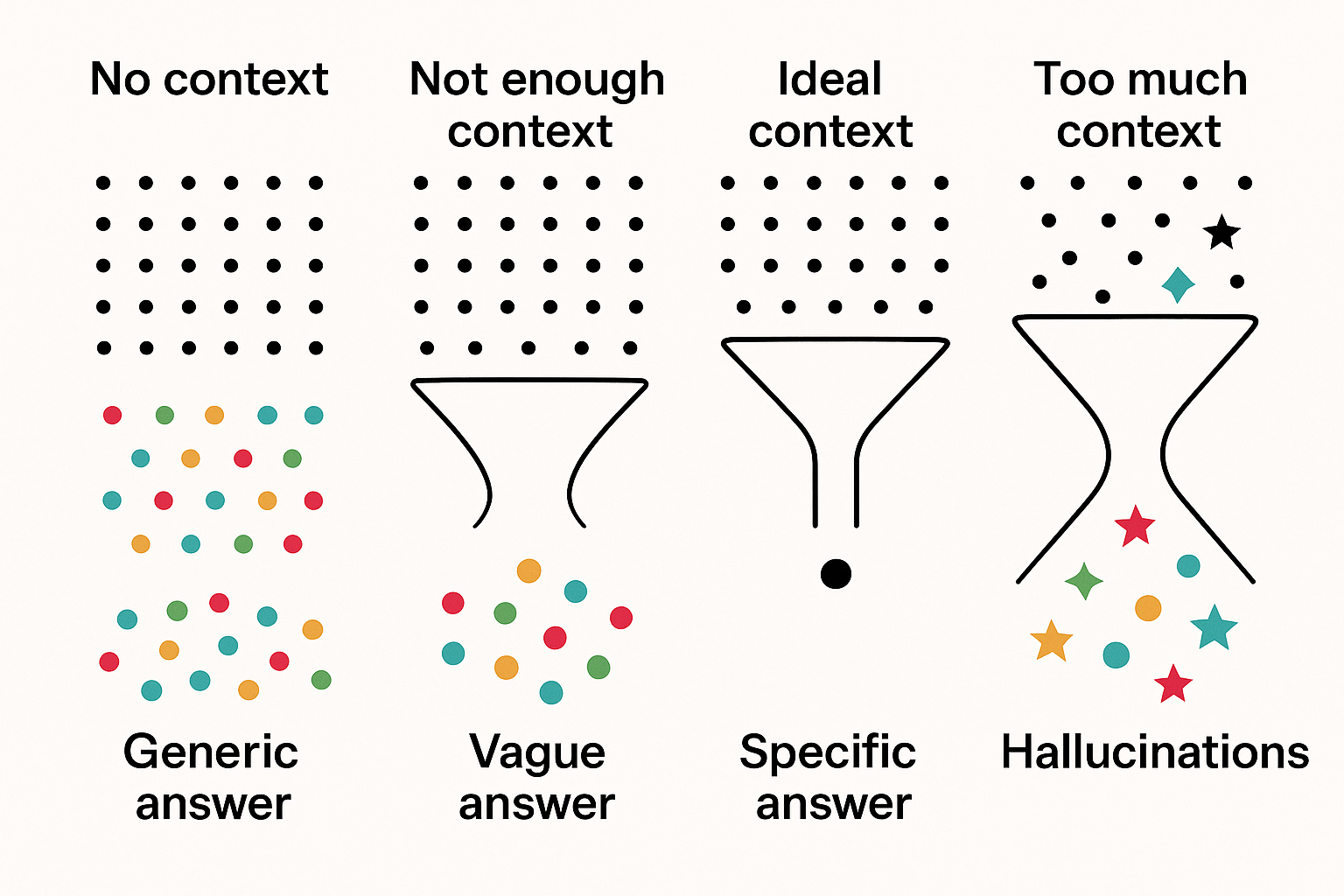
It's far from perfect, but it's the rough idea. The black dots on top represent the set of possible answers AI could give you based on your prompt. Below, AI filters that in some way to provide you with a response:
- When you provide no context, there's no filter/funnel and you get a generic answer
- When you do provide context but not enough, there's filtering, but it's fuzzy and you get vague answers back
- When you provide the "right context", the funnel is effective, and you get just what you need
- When you provide too much context, the filter is broken, and you get hallucinations
Having this mental model in mind, it should be obvious that providing the right quantity of the right context matters a lot. And that's where Context engineering comes into the picture.
Context engineering is about carefully designing and managing not just your prompts and their structure, but the entire context that they include.
It's the difference between:
- Asking "Help me write a newsletter"
- Asking "Help me write a newsletter" and providing clear explanations about your target audience, your writing style, your angle, your ideas, background, examples, constraints, rules, ...
The goal isn't just to craft a good prompt, but to optimize the entire context to improve outputs and reduce hallucinations.
In addition, I also consider that context engineering not only applies while crafting your prompts, but also during your discussions/interactions with AI. Each time you start a new "conversation", the AI context is empty (you can think of this as "memory"). The context provided in your initial prompt adds context/memory. And as the exchange continues, the context evolves. And it has to be kept under control. If you optimize your initial prompt, but then add too much to the context, you end up with the same issues. So, the context has to be managed throughout the interaction. That's why tools such as Claude Code integrate commands to clear or compact the context. It not only helps removing what you don't need anymore (helping AI focus on what matters), but also limits the tokens usage.
Context engineering may sound stupid/useless, but I think it makes perfect sense and is valuable, just like "software engineering". When you consider it seriously, it does make a difference. It's not just a trendy name.
I agree that we could do without those kinds of distinctions and just call it all "prompting", but the subtlety is important, as a way to educate people how to better use AI. Because most people only care about explaining the task/question "right", and don't necessarily consider what the context should include or not, whether it's bloated or clean, etc.
This is especially impactful when considering that prompts can now pull/push data, search the web, etc. It's all too easy to create "mental overload" for AI, leading to poor (or even dangerous) results, even if the prompts were well designed. In a way, it's similar to the distinction between Programming and Vibe Coding. Both lead to code, but said code is vastly different (at least for now 😂).
The Lab 🧪
After launching my AI Ghostwriter Guide last week, I continued working on my AI Assistant. I'm building it as part of my Obsidian vault, and using Claude Code, Model Context Protocol (MCP) servers and a few other tools.
Before, I was cramming everything into "mega-prompts". Now, I'm considering context engineering much more seriously, and I prefer a modular approach. My AI Assistant is more akin to a building with many employees (agents). When I enter the building, I discuss with the receptionist, who knows about all my AI Agents. When I select one, it gets loaded, along with its specific rules, context, tasks, ...
For instance, the Ghostwriter role includes a set of tasks such as
- Prepare an article
- Prepare a newsletter
- Create a social media post
- Create a social media thread
- Create a sales copy
- ...
The Ghostwriter role supports all of those tasks, but my AI assistant will ONLY load the description, rules, and context corresponding to specific tasks IF and WHEN I ask it to.
To achieve this, I combine a few "AI Design Patterns" (Did I just coined this term?? 😂), such as the Receptionist AI Design Pattern and the Prompt Lazy Loading AI Design Pattern (PLL). I'm basically applying good software architecture principles to AI.
Now that the approach, architecture and design are in place, I can focus on adding more roles and tasks to make my AI Assistant super powerful. And I have tons and tons of ideas.
To give you an example, if I ask my AI Assistant to become my AI Ghostwriter, and to write a newsletter, then it will load my writing style, my writing rules, my newsletter template, etc. Then it will ask me the right questions, and will generate the first draft based on my input. But if I then switch to my "Maintenance" agent, the context will be cleared, and the agent will only know about what it should. Thus, I keep the context clean at all times. No confusion, no mixed signals, fewer hallucinations.
If you're interested in learning more about building better AI workflows, stay tuned for upcoming products and workshops, and join the Knowii Community ❤️
Latest Articles
This week I published a deep dive into why Obsidian remains my tool of choice, even though platforms such as Tana have tons of cool features:

Quotes of the week
- Innovation happens at the speed of trust
- The most common error of a smart engineer is to optimize something that should not exist — Applicable to many things, including AI Prompting and Context Engineering
- Your mind is only as strong as your mission is clear — Applies to both humans and AI
- Wishes don't create change. Decisions do
- Decisions don't create change. Actions do
Interesting Links
Context Engineering
- Simon Willison's deep dive into context engineering: https://simonwillison.net/2025/Jun/27/context-engineering
- Phil Schmid on context engineering principles: https://www.philschmid.de/context-engineering
- How contexts fail and how to fix them: https://www.dbreunig.com/2025/06/22/how-contexts-fail-and-how-to-fix-them.html
- Practical guide to fixing your context: https://www.dbreunig.com/2025/06/26/how-to-fix-your-context.html
AI
- Andrej Karpathy on the present/future of software development: https://www.youtube.com/watch?v=LCEmiRjPEtQ
- A must-watch about AI, Large Language Models and the present/future of software development
- Google has release Gemini CLI, an alternative to Claude Code
- Tiago Forte is focusing on AI, like most of us: https://youtu.be/D9DpUDntQRc. His approach (cfr Business AI Master Prompt Questions of Tiago Forte) is cool, but I think it doesn't go nearly as far as it should
- LM Studio now supports Model Context Protocol (MCP): https://lmstudio.ai/blog/lmstudio-v0.3.17
- MCP: An accidentally universal plugin system: https://worksonmymachine.substack.com/p/mcp-an-accidentally-universal-plugin
- OpenAI Cookbook for better AI implementation: https://cookbook.openai.com
- ElevenLabs has released an AI Voice Assistant: https://elevenlabs.io/blog/introducing-11ai
- Claude can now run Claude within Claude Artifacts (aka "Claudeception"): https://x.com/alexalbert__/status/1937934036590334335
- Great visualization of how LLMs work: https://bbycroft.net/llm
- AI Models leaderboard: https://artificialanalysis.ai/leaderboards/models
- AI Providers leaderboard: https://artificialanalysis.ai/leaderboards/providers
- Speech to Text leaderboard: https://artificialanalysis.ai/speech-to-text
- Text to Speech leaderboard: https://artificialanalysis.ai/text-to-speech
- Text to Image leaderboard: https://artificialanalysis.ai/text-to-image
- Video generation leaderboard: https://artificialanalysis.ai/text-to-video/arena?tab=leaderboard
Knowledge Management
- Why organizing notes changed how someone thinks: https://medium.com/write-a-catalyst/why-organizing-my-notes-changed-how-i-create-think-and-work-c0c28fcf1fc7
- New text-to-path script in Excalidraw: https://x.com/zsviczian/status/1932494538183999893. Demo: https://www.youtube.com/watch?v=-fldh3cE2gs
- Publishing Obsidian notes with Quartz (App): https://www.xda-developers.com/turned-obsidian-vault-into-website
- Apple Notes now supports Markdown import/export: https://www.apple.com/newsroom/2025/06/ipados-26-introduces-powerful-new-features-that-push-ipad-even-further/
- Obsidian for writers: https://medium.com/@lennart.dde/obsidian-for-writers-organizing-your-novel-or-content-ideas-without-losing-your-mind-00937b66e6d3
- Sync Obsidian notes to Astro blog by Matt Williams: https://github.com/technovangelist/obsidian-blog-sync
- Terminal tool for Logseq journal entries: https://news.ycombinator.com/item?id=42279400
- Fundamental principles for a good PKMS: https://www.reddit.com/r/PKMS/comments/1k3ydsq/fundamentalsprinciples_for_a_good_pkms. BTW I shared many more in Knowledge Management for Beginners
- PKM and blogging automation: https://www.ryanwwest.com/why-blog/
That's it for today! ✨
About the Author
Hey there! I'm Sébastien Dubois, Knowledge Management coach, author, and founder of DeveloPassion.
I'm on a mission to help you escape information overload, organize yourself, your work, and better leverage AI.
Ready to get to the next level?
If you're tired of information overwhelm and ready to build a reliable knowledge system:
🎯 Join Knowii - Get access to our complete knowledge transformation ecosystem: https://www.store.dsebastien.net/l/knowii
📚 Take the Course - Master Knowledge Management fundamentals: https://knowledge-management-for-beginners.com
🛒 Explore my products and courses: https://www.store.dsebastien.net
🎁 Grab Free Resources - Start with the Knowledge System Checklist: https://www.dsebastien.net/free-knowledge-management-system-checklist
💬 Get Personal Coaching - Work with me 1-on-1: https://store.dsebastien.net/l/pkm-coaching
About Sébastien
I'm Sébastien Dubois, and I'm on a mission to help knowledge workers escape information overload. After 20+ years in IT and seeing too many brilliant minds drowning in digital chaos, I've decided to help people build systems that actually work. Through the Knowii Community, my courses, products & services and my Website, I share practical and battle-tested systems. You can follow me on X 🐦 and on BlueSky 🦋.
I am an author, founder, and coach. I write books and articles about Knowledge Work, Personal Knowledge Management, Note-taking, Lifelong Learning, Personal Organization, and Zen Productivity. I also craft lovely digital products.
If you want to follow my work, then become a member and join our community.
Ready to get to the next level?
If you're tired of information overwhelm and ready to build a reliable knowledge system:
- 🎯 Join Knowii and get access to my complete knowledge transformation system
- 📚 Take the Course and Master Knowledge Management
- 🚀 Start with a Rock-solid System: the Obsidian Starter Kit
- 🦉 Get Personal Coaching: Work with me 1-on-1
- 🛒 Check out my other products and services. These will give you a rock-solid starting point for your note-taking and Knowledge Management efforts



